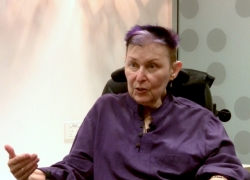
Breathing is no more an optional activity for Ann-Mason Furmage (pictured) than it is for anyone else.
But because Ms Furmage relies on electrical equipment to help her breathe, there is little she can do to reduce her power consumption or her electricity bill.
A report, released by PIAC and the Physical Disability Council of NSW(PDCN) in November 2012, highlights the inequity experienced by people with disability when it comes to electricity use and pricing.
More Power To You: electricity and people with physical disability (pdf) finds that people with physical disability face four layers of disadvantage:
- Low incomes mean people with disability struggle to afford electricity
- Disability brings additional general costs associated with wheelchairs and medicine
- Disability brings additional energy costs associated with heating, cooling, mobility, communication and life-saving equipment
- Disability can inhibit peoples capacity to adopt energy efficiency measures.
Click here to watch a video interview with Ms Furmage.
Return to People power: commitment, energy and dedication
Return to Celebrating 30 years of public interest advocacy